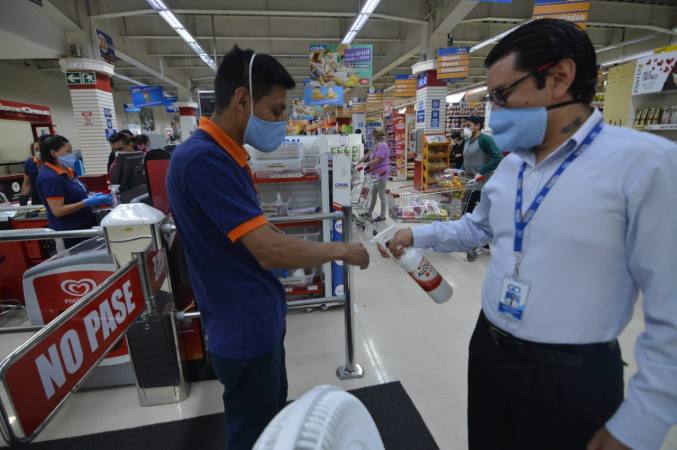In the time of the coronavirus, make good nutrition a food shopping priority
By Mark Mahoney
As we transition out of National Nutrition Month in the midst of the COVID-19 pandemic, the importance of good nutrition, particularly when many of us are under orders to shelter-in-place, is very important.
Healthy eating is especially important for keeping your immune system in top condition.
Here are some steps you can take to help you eat healthier and stay safer.
 Reduce trips to the supermarket — Plan ahead before you shop. Take time to visualize breakfast, lunch, and dinner for at least five days. What will you serve? What do you need? Think about the foods your family likes, your food preparation methods, interests and skills, and the time and energy you will have for preparing meals.
Reduce trips to the supermarket — Plan ahead before you shop. Take time to visualize breakfast, lunch, and dinner for at least five days. What will you serve? What do you need? Think about the foods your family likes, your food preparation methods, interests and skills, and the time and energy you will have for preparing meals.
There may not be more time to cook if you work from home, especially if you have responsibility for caring for any kids and meeting the work expectations of your employer.
Think nutrition. The healthiest meals emphasize whole grains, vegetables, and fruits—serve them in the greatest amounts. Meat portions should be smaller—this will save money and help keep dietary saturated fat in check.
Prepare a shopping list —and use it. This can help diminish impulse buying and provides a list of needed items.
Stocking up
Stock up on nutrition-packed foods that will stay fresh for a week or longer.
Focus on the following list for some recommendations:
- Breads—corn tortillas, whole grain English muffins, bagels, breads, wraps, frozen whole wheat waffles
- Grains—instant oatmeal, quick cooking pasta, frozen brown rice, couscous, refrigerated pizza crust
- Fruits—sturdy fresh fruit (apples, citrus), dried, plain frozen, canned in juice or water
- Vegetables—sturdy fresh veggies (celery, broccoli, onions, potatoes), plain frozen, low sodium canned, sun-dried
- Sauces—tomato pasta sauce, salsa
- Soups & Broths—canned, frozen, shelf-stable cartons
- 100% Juice—refrigerated, frozen, canned, boxed
- Milk—fresh, canned, shelf-stable packages
- Eggs—fresh eggs, egg whites in cartons
- Cheese—sliced, cubed, shredded, crumbled, grated hard cheese
- Beans/Legumes—canned beans (black beans, chickpeas), dry beans
- Nuts and seeds—bagged, canned, nut butters
- Chicken—frozen or canned
- Seafood—frozen ready-to-cook fish fillets, frozen shrimp, canned tuna, salmon, and sardines
- Beef—pre-made frozen lean ground patties or meatballs
- Flavorings—add zing with dried herbs & spices, vinegars, mustard, hot/steak sauces, lemon/lime juice, light dressings, honey, Greek yogurt
Other recommendations:
Limit purchases of frozen dinners and tempting foods — most frozen dinners are high in sodium, fat, and calories while foods such as chips, sodas, cookies and ice cream are high in empty calories and increase the costs of your grocery bill.
Focus on keeping costs down — consider low cost alternatives. Try a meatless meal, like chili with beans instead of beef. If fresh fruits and veggies are too costly, the best bets are plain frozen vegetables and fruits. Purchase low sodium canned veggies and fruits canned in juice or water and, if these are in short supply, buy regular canned fruits and veggies but drain and rinse before use.
Don’t forget about friends and neighbors, especially older adults or those with health conditions. Could you save them a trip to the grocery store?
Consider online shopping. Many stores are increasingly offering this service which can save you time and help in social distancing. Plan ahead and consider the delivery schedules.
Stay safe and try to get some physical activity on a daily basis.
During the Coronavirus pandemic at the supermarket:
Use a disinfecting wipe — wipe your hands and grocery cart handle, then put the wipe in the trash.
Prepared for the unexpected — supermarkets are running low on many items. Be sure to take your own bags. Be ready with a back-up plan if an ingredient you need is unavailable.
Keep the less fortunate in mind — contribute to local pantries and soup kitchens now. Then, when it is all over — donate extra food you stocked up on that is still fresh and safe to eat.
Use contactless payment or credit cards. If you use the payment keypad, tap the buttons and screen with your knuckle — then use hand sanitizer after completing your payment.
Remember that a positive mindset is the key to getting through this pandemic physically and mentally healthy.
Read my previous column published in Cuenca HighLife — Tips for coping with stress and anxiety — I focus on the mental health aspects related to the unprecedented coronavirus pandemic. I offer relevant recommendations and links to resources that can be helpful.
Thanks to my fellow colleagues who are members of the American Society for Nutrition for much of the content provided here.
__________________________

Mark Mahoney, Ph.D.
Health blogger for The Tallahassee Democrat, Mark A. Mahoney, Ph.D. has been a Registered Dietitian/Nutritionist for over 30 years and completed graduate studies in Nutrition & Public Health at Columbia University. Mark has spent his professional career working to help improve the health of individuals and communities, beginning in 1975 with a two-and-a-half year stint as an Agricultural Extension Agent/Applied Nutritionist in a small community in northwestern Ecuador, then completing two additional years of Peace Corps service as a Public Health Nutritionist & Health Educator in Chile. Write to Mark at marqos69@hotmail.com.





















